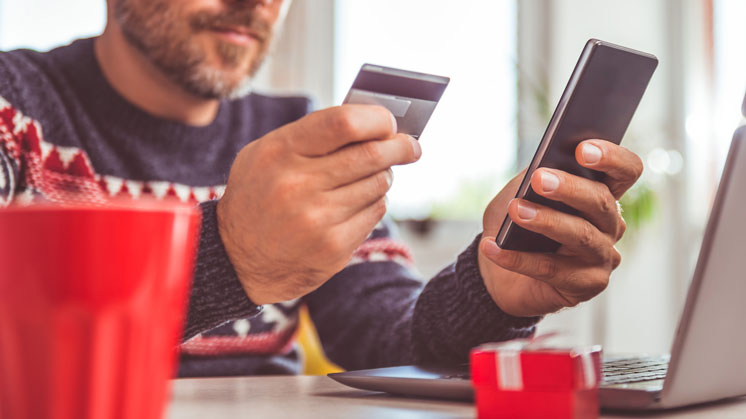Staying safe online when connecting at Christmas
13 December 2018
At Get Safe Online, we work all year round to provide individuals and businesses with balanced, practical advice on staying safe online.
So why do we single out Christmas as a particular time to highlight the importance of being vigilant and ensuring your online hygiene is up to scratch?
For most people, there’s a huge amount going on at this time of year. You’re buying presents, organising entertaining and socialising, keeping tabs on the youngsters in your life and making sure everybody’s happy as they compete for your attention. There’s so much happening, in fact, that sometimes it’s easy to forget things like checking whether something you come across online is authentic or not.
It’s no coincidence that Christmas is also one of the busiest times of the year for cybercriminals, who exploit the fact that people are distracted and take advantage of our additional online activity.
That’s why through December we’re highlighting some essential tips that, though they apply throughout the year, are collectively especially relevant over the festive season.
Smartphones, tablets and computers
Before you start using new or pre-owned Internet-connected devices – including Apple phones, tablets and computers – make sure they’re protected with a security app or software, and a PIN or passcode. Install updates to operating systems, apps and software as soon as prompted. Download apps only from official sources such as App Store, Google Play or Microsoft Store. Perform regular backups to safeguard your valuable documents, photos and other files.
Connected devices and wearables
For new connected devices such as voice assistants, CCTV cameras, appliances or kids’ toys, change passwords from the factory-set ones to your own straight away to improve security. This goes for phones and tablets too.
Second-hand mobile devices
If you’ve bought a pre-owned device, remove the previous owner’s settings and data if this hasn’t already been done. If you’re selling, carry out a reset to prevent others seeing your data. You can find out how from the manufacturer’s website.
Out and about with connected devices
If you’re out socialising or staying at a hotel, don’t use public Wi-Fi hotspots if you’re doing anything confidential online, as you can’t assume they’re secure. Keep the devices themselves secure as they can make attractive targets for thieves.
Don’t overshare
It’s great to share good times on social media, but think before you post: is it really necessary, and could it provide confidential information for a fraudster? Also, posting that the family is out or away for a seasonal break is a big clue for burglars that your home is empty. Posting photos of your kids is creating or adding to their online presence. Take a few minutes over the break to update your privacy settings.
Scams
Clicking on email attachments or links in unexpected emails, text messages and posts could infect your device with malware and/or compromise your personal or financial security. Unexpected phone calls claiming to be from banks, retailers, parcel firms or software support companies should be treated with caution.
Children and young people
Sit down and speak to your children about safe and responsible use of the Internet, including what they share, who they’re communicating with and what content they’re accessing – including apps and games. Consider downloading a respected parental control app to block unsuitable content. And make sure that bills aren’t being run up for in-game purchases.
Online shopping
If you still have Christmas shopping to do online:
- Make sure shopping websites are authentic by carefully checking the address is spelled correctly. Fraudsters can set up convincing websites with very similar spelling to the authentic one;
- Ensure that payment pages are secure, by checking that addresses begin with ‘https’ (‘s’ is for secure) and there’s a closed padlock in the address bar;
- Don’t pay for anything – goods, event tickets or holidays – by transferring money directly to people or companies you don’t know, however desperate you are to buy. If it’s a fraud, it’s doubtful the bank will be able to recover or refund your money. The safest way to pay for anything is by credit card;
- Avoid fake goods: they’re of lower quality than the real thing and can even be dangerous in use.
Finally, on behalf of everyone at Get Safe Online, I’d like to wish you a safe and happy Christmas and New Year.
PREVIOUS POSTNEXT POST
How to protect yourself from romance fraud when you’re dating online
13 February 2019
As many people’s thoughts turn to romance around Valentine’s Day, here are some expert tips to help online daters keep themselves safe from fraud.
CONTINUE READING
How retailers can combat fraud during Black Friday and Cyber Monday
21 November 2018
The retail sector faces increased pressure during Black Friday and Cyber Monday, and criminals will seek to take advantage – what can retail companies do to protect themselves from fraud during this busy period?
CONTINUE READING
Back to blog home >


